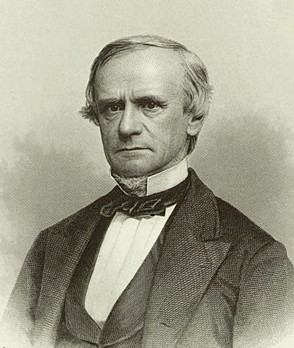Related Research Articles

Chinese checkers (US) or Chinese chequers (UK), known as Sternhalma in German, is a strategy board game of German origin that can be played by two, three, four, or six people, playing individually or with partners. The game is a modern and simplified variation of the game Halma.

John Caldwell Calhoun was an American statesman and political theorist who served as the seventh vice president of the United States from 1825 to 1832. Born in South Carolina, he adamantly defended American slavery and sought to protect the interests of white Southerners. Calhoun began his political career as a nationalist, modernizer and proponent of a strong federal government and protective tariffs. In the late 1820s, his views changed radically, and he became a leading proponent of states' rights, limited government, nullification, and opposition to high tariffs. Calhoun saw Northern acceptance of those policies as a condition of the South's remaining in the Union. His beliefs heavily influenced the South's secession from the Union in 1860 and 1861. Calhoun was the first of two vice presidents to resign from the position, the second being Spiro Agnew, who resigned in 1973.

The House of Commons of Canada is the lower house of the Parliament of Canada. Together with the Crown and the Senate of Canada, they comprise the bicameral legislature of Canada.

Anti-Americanism is a term that can describe several sentiments and positions including opposition to, fear of, distrust of, prejudice against or hatred toward the United States, its government, its foreign policy, or Americans in general. Anti-Americanism can be contrasted with pro-Americanism, which refers to support, love, or admiration for the United States.

The Parliament of Australia is the legislature of the federal government of Australia. It consists of three elements: the monarch of Australia, the Senate, and the House of Representatives. It combines elements from the Westminster system, in which the party or coalition with a majority in the lower house is entitled to form a government, and the United States Congress, which affords equal representation to each of the states, and scrutinises legislation before it can be signed into law.

The House of Representatives is the sole chamber of the New Zealand Parliament. The House passes laws, provides ministers to form the Cabinet, and supervises the work of government. It is also responsible for adopting the state's budgets and approving the state's accounts.

In some parliamentary systems, politicians are said to cross the floor if they formally change their political affiliation to a political party different from the one they were initially elected under. In Australia though, this term simply refers to Members of Parliament (MPs) who dissent from the party line and vote against the express instructions of the party whip while retaining membership in their political party.

Coin flipping, coin tossing, or heads or tails is the practice of throwing a coin in the air and checking which side is showing when it lands, in order to randomly choose between two alternatives. It is a form of sortition which inherently has two possible outcomes. The party who calls the side that is facing up when the coin lands wins.

Bleachers, or stands, are raised, tiered rows of benches found at sports fields and other spectator events. Stairways provide access to the horizontal rows of seats, often with every other step gaining access to a row of benches.

Patriots, also known as Revolutionaries, Continentals, Rebels, or Whigs, were colonists in the Thirteen Colonies who opposed the Kingdom of Great Britain's control and governance during the colonial era, and supported and helped launch the American Revolution that ultimately established American independence. Patriot politicians led colonial opposition to British policies regarding the American colonies, eventually building support for the adoption of the Declaration of Independence, which was adopted unanimously by the Second Continental Congress on July 4, 1776. After the American Revolutionary War began the year before, in 1775, many patriots assimilated into the Continental Army, which was commanded by George Washington and which secured victory against the British Army, leading the British to acknowledge the sovereign independence of the colonies, reflected in the Treaty of Paris, which led to the establishment of the United States in 1783.

The canter and gallop are variations on the fastest gait that can be performed by a horse or other equine. The canter is a controlled three-beat gait, while the gallop is a faster, four-beat variation of the same gait. It is a natural gait possessed by all horses, faster than most horses' trot, or ambling gaits. The gallop is the fastest gait of the horse, averaging about 40 to 48 kilometres per hour. The speed of the canter varies between 16 and 27 kilometres per hour depending on the length of the horse's stride. A variation of the canter, seen in western riding, is called a lope, and is generally quite slow, no more than 13–19 kilometres per hour (8–12 mph).
Party switching is any change in political party affiliation of a partisan public figure, usually one currently holding elected office.

John Russell Bartlett was an American historian and linguist.

A gambrel or gambrel roof is a usually symmetrical two-sided roof with two slopes on each side. The upper slope is positioned at a shallow angle, while the lower slope is steep. This design provides the advantages of a sloped roof while maximizing headroom inside the building's upper level and shortening what would otherwise be a tall roof, as well as reducing the span of each set of rafters. The name comes from the Medieval Latin word gamba, meaning horse's hock or leg. The term gambrel is of American origin, the older, European name being a curb roof.

Welsh settlement in the Americas was the result of several individual initiatives to found distinctively Welsh settlements in the New World. It can be seen as part of the more general British colonization of the Americas.
Gender-neutral language or gender-inclusive language is language that avoids reference towards a particular sex or gender. In English, this includes use of nouns that are not gender-specific to refer to roles or professions, formation of phrases in a coequal manner, and discontinuing the collective use of male or female terms. For example, the words policeman and stewardess are gender-specific job titles; the corresponding gender-neutral terms are police officer and flight attendant. Other gender-specific terms, such as actor and actress, may be replaced by the originally male term; for example, actor used regardless of gender. Some terms, such as chairman, that contain the component -man but have traditionally been used to refer to persons regardless of sex are now seen by some as gender-specific. An example of forming phrases in a coequal manner would be using husband and wife instead of man and wife. Examples of discontinuing the collective use of terms in English when referring to those with unknown or indeterminate gender as singular they, and using humans, people, or humankind, instead of man or mankind.

Churchill Caldom Cambreleng was an American businessman and politician from New York. He is notable for his service in the United States House of Representatives from 1821 to 1839, including terms as chairman of several high-profile committees. In addition, he served as U.S. Minister to Russia from 1840 to 1841.
The phrase seeing the elephant is an Americanism which refers to gaining experience of the world at a significant cost. It was a popular expression of the mid to late 19th century throughout the United States in the Mexican–American War, the Texan Santa Fe Expedition, the American Civil War, the 1849 Gold Rush, and the Westward Expansion Trails.
A labor dispute is a disagreement between an employer and employees regarding the terms of employment. This could include disputes regarding conditions of employment, fringe benefits, hours of work, tenure, and wages to be negotiated during collective bargaining, or the implementation of already agreed upon terms. It could further concern the association or representation of those who negotiate or seek to negotiate the terms or conditions of employment.
The phrase ‘to go up Salt River’ or ‘to be rowed up Salt River’ is a colloquial political slogan or catchphrase originating from the Antebellum South era of the United States, with its earliest references from 1827 onwards. It was often used in political cartoons and speeches as a metaphor to symbolise political defeat, or even specifically synonymous with ‘losing an election.’ It was later popularised in political expression by Ohio Representative Alexander Duncan when using it in a speech in the House of Representatives in 1839.
References
- ↑ Hirsch, Eric Donald; Kett, Joseph F.; Trefil, James S. (2002). The New Dictionary of Cultural Literacy. Houghton Mifflin Harcourt. p. 78. ISBN 0618226478 . Retrieved June 20, 2012.
- ↑ "sit on the fence" . Retrieved June 20, 2012.
- 1 2 3 Bartlett, John Russell (1848). Dictionary of Americanisms: A Glossary of Words and Phrases, Usually Regarded as Peculiar to the United States. Bartlett and Welford. ISBN 978-1-4047-0500-5.